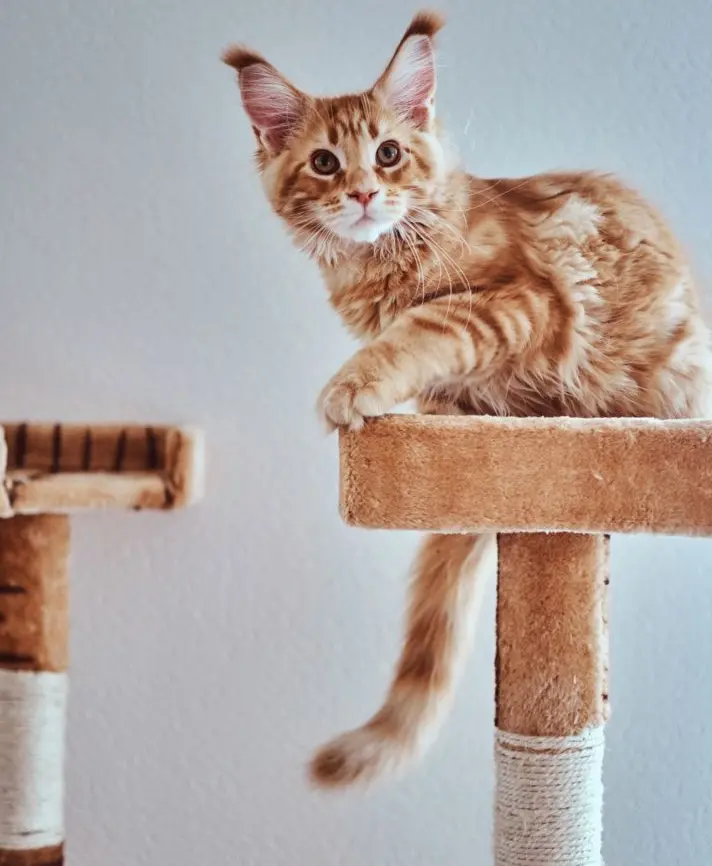How To Calm A Kitten: 10 Effective Tricks
Discover effective techniques to calm your energetic kitten and create a peaceful environment for both of you.
Kittens tend to be hyper and energetic, which can be a handful at times. Also, kittens can get easily stressed when overstimulated or if exposed to an undesirable experience. As the owner, you should know how to calm a kitten to manage its behavior. This will also reduce your kitten’s stress so that it won’t border to aggression and behavioral problems. You can also try diffusing essential oils, massage, more playtime, and soothing sounds to calm a nervous kitten.

Understanding a Kitten’s Behavior
Understanding a kitten’s behavior is key to effectively calming them. Kittens are naturally curious and full of energy, but they can also become easily overwhelmed or frightened. For example, a puffed-up tail and arched back may indicate fear or aggression, while a relaxed posture and slow blinking may indicate contentment.
If you are wondering how to calm a kitten, you can do so by observing and understanding their behavior and emotions. This will help you better anticipate their needs and provide them with the necessary comfort and security.
How To Calm A Kitten: 10 Effective Tricks
Below, I discussed ten easy steps you can take to calm your kitten. I’ve used these tips and tricks for the hundreds of kittens I’ve fostered.
1. Let catnip do the trick
One of the easiest ways for how to calm a kitten is to give it some catnip. While you might think that catnip will stir up their cat, it can also have an opposite effect.

Catnip is a great choice in soothing a kitten that’s either hyperactive or scared. The best thing is that catnip is generally safe and very effective sedative.
However, not all cats have a gene that reacts to catnip. About a third of the cat population doesn’t respond to this herb. To check if your kitten is one of those, try giving it a small amount of catnip and see how it will react. If it dismisses the ‘nip, you can always try other methods I discussed here.
2. Go inside a quiet room
Is your kitten afraid and always on edge? Bring it inside a quiet room away from the noise or crowd. Cats can get overstimulated through excessive petting or external elements. Loud sounds, sudden changes in the environment, and strangers can stress a kitten. Learn here how to get a cat out of room.
Changing your cat’s environment will help tone down its nerves. If your kitten is nervous and you expect fireworks, many guests, and the likes, it’s best to keep it cozy on a quiet spot.
3. Please give it some playtime
Calming a kitten doesn’t always have to be quiet and gentle. Playtime is also a great distraction from anything that’s exciting or scaring your kitty. Also, playing with your cat will burn its extra energy and tone down its nerves.
I encourage playtime that stimulates your cat’s instincts. Play games that engage the kitten’s hunting instincts as well as climbing habits. Games like feather and string, interactive puzzles, paper bags, hide-and-seek, and crumpled paper are just some of the energy-busting options. After 15 to 20 minutes, your kitten will probably want to take a nap.
4. Have the kitten checked
Sometimes, kittens won’t calm down due to a health condition. While most kittens will become neurotic because of anxiety and fear, some are suffering from hyperthyroidism. This condition will make the kitten increasingly active and thirsty. You will also notice a sudden boost in appetite, accompanied by unexplained weight loss.
The best way to figure out who to calm a kitten with a health condition is to consult with your vet for proper diagnosis and treatment.
5. Provide a safe space
Kittens should be raised and kept in a safe home. Kittens, and even adult cats, are usually fearful of open spaces.

For how to calm a kitten that is afraid of large open spaces, offer your pet a cozy spot where it can curl and feel safe. A corner with a cat cave is the right choice. This mimics the denning instinct of cats to avoid predators.
6. Practice spot-cleaning
I’ve talked to a pet expert before, and one thing he told me is to avoid cleaning a kitten’s territory entirely. A squeaky clean cat cage might look good, but it also erases their scent. This will make your kitten confused and anxious.
Please take note that erasing your kitten’s smell on its safe space will only stir stress. It would not be easy to calm the kitten down because it can’t find its comfort zone.
7. Be around
Sometimes, your presence is more than enough to calm a kitten. Your kitten sees you as its mother the moment you bring it home. So when it’s scared or nervous, it will gravitate towards you to seek comfort and security.

In this case, you must comfort the little feline and make sure that it feels secure in your presence. Learn here why does my cat want me to watch her eat.
8. Use calming oils and treats
Another great way to calm a nervous kitten down is to diffuse some calming oils. BUT before you proceed, research which ones are safe or toxic to cats and which ones they really hate and might deter them.
Most vets recommend lavender, frankincense, and copaiba for cats. Still, I recommend consulting your cat’s veterinarian before diffusing any of it to prevent the possibility of poisoning.
If you’re not comfortable diffusing essential oils, you can get calming treats for your kitten instead. There are commercially available calming chews explicitly made for cats, which are infused with naturally calming ingredients. This is also an excellent alternative to catnip if your cat doesn’t respond to such an herb.
9. Put on some white noise
Aside from their keen sense of smell, kittens also have a heightened sense of hearing. This is why your kitten quickly gets scared of a honking car, thunder, and fireworks. If you can’t control such noise, you can play white noise as a buffer so your kitten will calm down.
Each cat is different, and so is their reaction to sounds. Try classical music, nature sounds, and simply the television on. See how your kitten will react and which one works best. You can also pair the soothing sound with diffused lavender oil to help calm your kitten’s tensed mind.
10. Give some kitten massage
Lastly, consider giving your kitten a calming massage. Learning how to calm a kitten with a massage is easy and builds your bond with your cat. The same with humans, massage boosts lymphatic and blood flow among kittens, which can have a soothing effect. However, some cats may not react well to massage due to overstimulation.

Again, it’s about knowing what your cat likes. Please read here why does my cat lick me and then bite me
The key here is finding your kitten’s ‘safe zones’. These are spots that they love being scratched, stroked, or pet. Most of the time, cats love getting massaged on the shoulders, head, tailbone, neck, and tummy. You can also diffuse some lavender oil to boost the calming effect of the massage.
Conclusion
Knowing how to calm a kitten is probably on every cat owner’s checklist. Felines are naturally energetic, while some get scared easily. No matter what, it’s essential to help them tone down to avoid injuries and negative behavior. If you have a hyper cat that you are trying to calm down, read more here.
